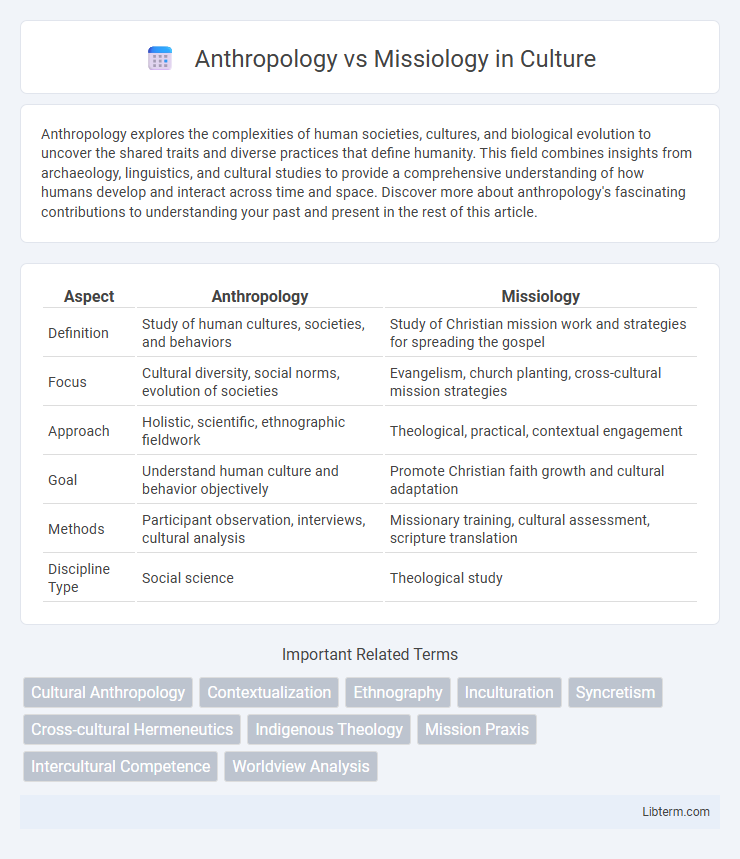Anthropology explores the complexities of human societies, cultures, and biological evolution to uncover the shared traits and diverse practices that define humanity. This field combines insights from archaeology, linguistics, and cultural studies to provide a comprehensive understanding of how humans develop and interact across time and space. Discover more about anthropology's fascinating contributions to understanding your past and present in the rest of this article.
Table of Comparison
| Aspect | Anthropology | Missiology |
|---|---|---|
| Definition | Study of human cultures, societies, and behaviors | Study of Christian mission work and strategies for spreading the gospel |
| Focus | Cultural diversity, social norms, evolution of societies | Evangelism, church planting, cross-cultural mission strategies |
| Approach | Holistic, scientific, ethnographic fieldwork | Theological, practical, contextual engagement |
| Goal | Understand human culture and behavior objectively | Promote Christian faith growth and cultural adaptation |
| Methods | Participant observation, interviews, cultural analysis | Missionary training, cultural assessment, scripture translation |
| Discipline Type | Social science | Theological study |
Defining Anthropology: Scope and Focus
Anthropology is the scientific study of humans, their behaviors, cultures, and evolutionary history, encompassing subfields such as cultural, biological, linguistic, and archaeological anthropology. Its scope extends from understanding human diversity and social structures to the analysis of cultural practices and human adaptation across time and space. Anthropology aims to provide holistic insights into how humans live, interact, and develop within various environmental and social contexts.
Missiology Explained: Purpose and Practice
Missiology is the interdisciplinary study dedicated to understanding and advancing Christian mission work by examining its theological foundations, historical development, and practical methodologies. It emphasizes the purpose of spreading the gospel, contextualizing religious teachings across diverse cultures, and equipping missionaries with effective strategies for evangelism and community engagement. Rooted in theological principles and cultural insights, missiology integrates research on cultural anthropology, communication, and religious studies to enhance the impact and sustainability of mission efforts worldwide.
Historical Development of Anthropology and Missiology
Anthropology emerged as a formal discipline in the 19th century, rooted in the study of human societies, cultures, and biological evolution, influenced by figures such as Franz Boas and Bronislaw Malinowski. Missiology developed from the 19th-century Protestant missionary movement, evolving into an academic field analyzing the theological, cultural, and historical aspects of Christian mission work. Both fields intersect in examining human behavior and cultural interactions, with anthropology providing critical insights into indigenous cultures that shaped missionary strategies and theological reflections.
Core Theories in Anthropology vs Missiology
Core theories in anthropology revolve around cultural relativism, structural functionalism, and symbolic interactionism, emphasizing the study of human societies, cultures, and behaviors through observation and participant inquiry. Missiology centers on theories of contextualization, inculturation, and cross-cultural communication, focusing on the transmission of religious beliefs and practices within diverse cultural contexts. While anthropology aims to understand human diversity and social norms objectively, missiology applies theological frameworks to engage and transform cultures through religious mission activities.
Methodological Approaches: Fieldwork and Research
Anthropology employs ethnographic fieldwork emphasizing participant observation and qualitative data collection to understand cultural practices in natural settings. Missiology integrates fieldwork with theological analysis, combining ethnographic methods with scriptural interpretation to assess the impact of missions on communities. Both disciplines utilize qualitative research, but missiology often incorporates faith-based frameworks alongside anthropological techniques.
Interdisciplinary Overlaps and Distinctions
Anthropology and missiology intersect through their shared emphasis on understanding human cultures, beliefs, and social behaviors, providing critical insights into effective communication and cultural sensitivity in religious contexts. Anthropology employs ethnographic methods and cultural analysis to study human diversity, while missiology focuses on the theological and practical aspects of missionary work and religious outreach. Despite their interdisciplinary overlap in field research and cultural interpretation, anthropology maintains a descriptive and analytical stance, whereas missiology adopts a normative approach aimed at religious transformation and evangelism.
Influence on Cultural Understanding
Anthropology enhances cultural understanding by studying human societies, behaviors, and their historical development, providing deep insights into cultural norms and values. Missiology focuses on the practical application of this knowledge to engage meaningfully with different cultures in religious contexts, emphasizing respectful communication and contextualization of faith. Combining anthropology's analytical frameworks with missiology's mission strategies fosters more effective cross-cultural interactions and promotes mutual respect.
Application in Global Missions and Evangelism
Anthropology provides critical insights into cultural beliefs, social structures, and communication patterns essential for effective global missions and evangelism. Missiology applies these anthropological findings to strategize contextualized outreach methods that respect indigenous cultures while promoting the Christian message. Integrating anthropology enhances mission work by fostering cultural sensitivity and improving the reception of the gospel across diverse populations.
Ethical Considerations in Both Disciplines
Ethical considerations in anthropology emphasize respect for cultural diversity, informed consent, and the avoidance of harm to studied communities, ensuring researchers do not impose external values or disrupt social norms. Missiology, while similarly committed to respect and non-maleficence, navigates ethical challenges related to proselytism, advocating for religious beliefs without coercion and with sensitivity to local traditions and autonomy. Both disciplines prioritize ethical integrity, but anthropology centers on cultural understanding, whereas missiology balances evangelistic motives with respect for individual and community rights.
Future Challenges and Collaborative Opportunities
Anthropology and missiology face future challenges such as navigating cultural sensitivities, ethical research practices, and rapidly changing social dynamics within global communities. Collaborative opportunities arise in integrating anthropological insights with missiological strategies to enhance intercultural communication and contextualize religious outreach effectively. Joint efforts can leverage ethnographic methods to address complex societal issues, fostering sustainable development and respectful cross-cultural engagements.
Anthropology Infographic

 libterm.com
libterm.com